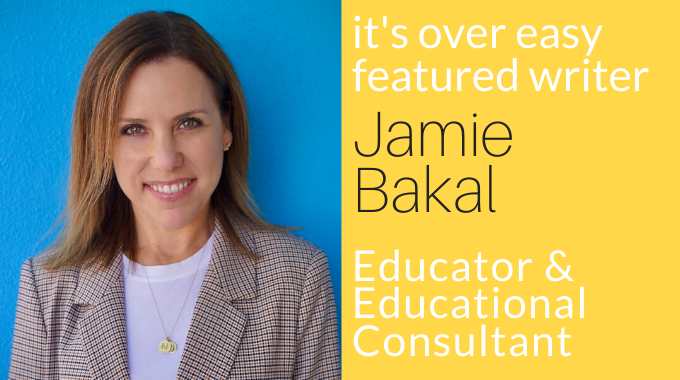Written Exclusively for It's Over Easy by Education Consultant Jamie Bakal
Co-parenting successfully requires focus and determination from the adults involved in raising the child, including step-parents and significant others. In the age of COVID-19, in many cities and states, co-parenting now also includes managing online learning for children. In this article, top Educational Consultant Jamie Bakal provides a roadmap for co-parents to set their children up for success in the new academic year.
-
ROUTINE. ROUTINE. ROUTINE
Children thrive on a schedule, and in a Covid-world, where there are so many unknowns and so much uncertainty, it is more important than ever that parents help their children establish a daily schedule for their school day. This schedule should obviously coincide with the school provided schedule. But it should also include meal times, exercise, and socialization with friends (either socially distant or over Zoom). This schedule should be printed and put by a child’s workspace as a reference, and it should be the same schedule at both parents’ homes. But the benefits of routine extend beyond the school schedule. Children are most focused when they are well-rested. Bedtimes and wake times should be part of the routine that remain the same at both homes. -
CONSISTENCY
Children need consistency. By establishing “rules” for remote learning, that are consistent at both parents’ homes, children will understand their boundaries, and they will not feel confused or question the expectations. Similarly, “rules” for remote learning that resemble “rules” for in-person learning help set the tone for a successful day. Children should be dressed in clothes, not pajamas, for the school day. They should show up to their Zoom classes on time and prepared. Students should not eat during class. They would not eat during class in-person, therefore they should not eat during class at home. -
DEDICATED WORKSPACE
Keeping students of all ages engaged during virtual learning is key to success. It’s important for kids to have their own workspace, where they can work independently and ideally focus without distraction. It is important that kids have this at both of their parents’ homes, even if the space looks different. When kids can personalize and incorporate their own style within their workspace, they become best equipped to take ownership of their learning. -
WEEKLY CHECK-IN
Parents want to know how kids are doing, and what kids are up to in school. Kids often have a lot going on and don’t want to spend time telling their mom or dad about everything at school, let alone having to say everything twice for parents who are separated or divorced. By setting up a google doc that can be used like a journal, a child can give the details parents want/need without parents having to dig it out of them. It also has the benefit of kids not having to repeat everything to both parents. Set up one day/week (I would recommend Sundays) where the child can write about what is on the docket for the upcoming week. They can also share any news from the previous week. -
THIS IS ABOUT THE CHILD/CHILDREN
Co-parenting is tough enough in a non-Covid world. But add a pandemic into the mix and it can definitely make parents lose sight of what is most important: the children. This pandemic has caused so many profound losses for children, starting with school and peer interaction. They do not need any additional discord in their lives…especially right now. Children need to feel supported by both parents. They need to know that their parents, together, will help them thrive. They need to know that despite a separation or divorce, and despite a pandemic, they are deeply loved, they are safe in both parents’ homes, and both parents will help them get through this.
Tap for more info on how to co-parent
About the Author
Jamie Bakal helps families manage the process of applying to k-12 independent schools by ensuring that she helps finds the best school and education for the individual child. She is also on the Associate’s Board of City Year Los Angeles, which helps to close gaps in high-need schools by supporting students' academic and social-emotional development while also providing schools with the additional capacity to enhance school culture and climate. Jamie lives with her two young daughters and husband in Los Angeles.




Comments